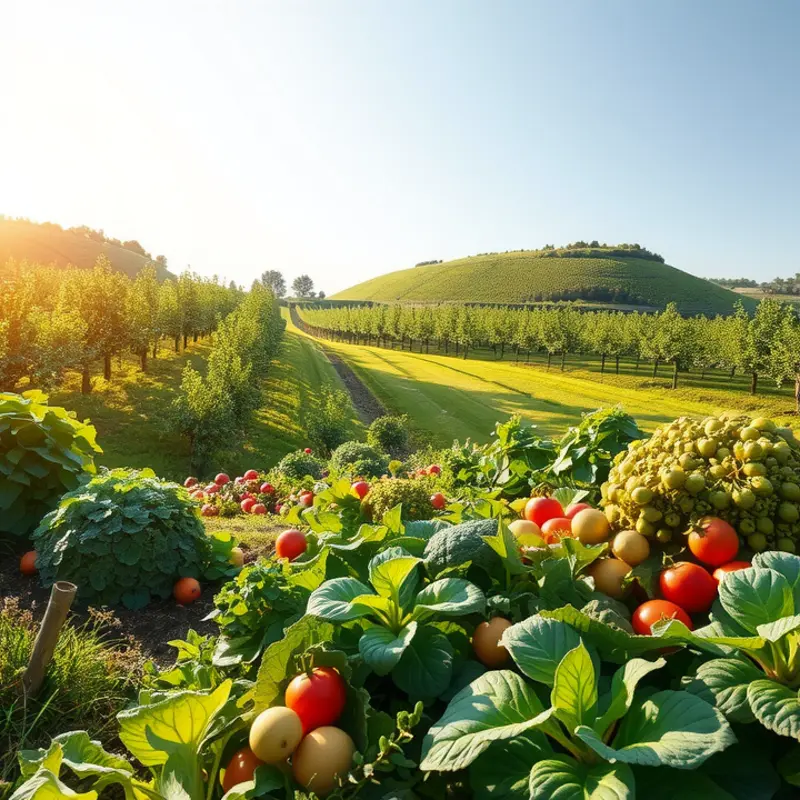Embracing eco-aware meal decisions can make a significant difference in reducing your carbon footprint. From plant-based diets to local sourcing, there are countless ways to make food choices that are kinder to the environment. This guide explores actionable strategies for integrating sustainable practices into your meals, empowering you to contribute positively to the planet with every bite you take.
Choosing Plant-Based Ingredients

Adopting a plant-based diet contributes significantly to sustainability. Fruits, vegetables, legumes, and grains generally require less water and land, producing lower greenhouse gas emissions compared to animal-sourced foods. By choosing these ingredients, individuals can actively reduce their carbon footprint, making a positive impact on the environment.
Plant-based diets also bring numerous health benefits. They are typically rich in essential nutrients, fiber, and antioxidants. These components promote heart health, aid digestion, and provide energy, contributing to an overall sense of well-being. Many studies highlight the link between plant-based eating and reduced risks of chronic diseases, such as heart disease, diabetes, and certain cancers.
Moreover, plant-based ingredients unlock a world of culinary creativity. Chefs and home cooks alike can explore the vast array of flavors and textures that plants offer. Whether it’s the hearty creaminess of avocados or the robust nuttiness of quinoa, every meal can become a delightful adventure. Crafting vibrant salads with seasonal greens or experimenting with legumes in creamy soups can bring exciting flavors to the table.
Supporting local growers and choosing seasonal produce is another way to enhance the eco-friendliness of your meals. Local farms often use sustainable practices that reduce the environmental impact of food production. Buying from these sources not only cuts down the carbon footprint associated with transportation but also supports community economies. Additionally, consuming seasonal produce ensures fresher, tastier ingredients at their nutritional peak.
Understanding the availability of seasonal produce can also aid in meal planning. For example, spring is perfect for leafy greens and peas, while autumn offers root vegetables and squashes. This knowledge allows individuals to create meals aligned with nature’s cycles, aligning personal habits with environmental rhythms.
Incorporating more plant-based ingredients need not be complex. Simple swaps can make a big difference in reducing meat consumption. Consider replacing a portion of meat in a meal with lentils or beans, which are high in protein and filling. Such changes can be gentle yet effective steps toward more sustainable eating habits.
For those looking to make their plant-based cooking more convenient, practical ingredient batching techniques can save time and reduce waste. Prepare large batches of grains or legumes and store them for quick use throughout the week. Learn more about practical ingredient batching here. This approach not only ensures that plant-based meals are readily accessible but also minimizes food waste.
By embracing plant-based ingredients and supporting local, seasonal produce, individuals can make meal decisions that nourish both the planet and themselves. These choices celebrate diversity, encourage health, and promote a balanced ecosystem, crafting a sustainable future with every bite.
Sustainable Sourcing and Minimal Waste

Understanding where your food comes from is crucial in shaping an eco-aware lifestyle. Supporting local farms not only reduces the carbon footprint associated with food transportation but also strengthens local economies. Purchasing locally allows consumers to enjoy fresh, seasonal produce, while simultaneously encouraging sustainable farming practices in the community.
To truly commit to an eco-conscious eating routine, reducing food waste is paramount. Nearly one-third of all food produced globally is wasted each year, contributing significantly to environmental degradation. Smart meal planning and mindful shopping are essential strategies in combating this waste. By prioritizing bulk purchases of non-perishable items and focusing on unprocessed foods, consumers can minimize packaging waste and ensure longer shelf-life of their pantry staples.
When shopping, an awareness of seasonal produce offers not only fresh flavors but also reduces demand for energy-intensive imports. Seasonal eating reduces carbon emissions and supports farming cycles that are harmonious with nature. Get into the habit of visiting farmers’ markets or signing up for a Community Supported Agriculture (CSA) program to gain more visibility into how your food is produced.
Embracing sustainable packaging is an essential component of an eco-friendly diet. Opt for products sold in recyclable or biodegradable packaging, and consider refill stations where available. Glass jars, cloth bags, and stainless steel containers make excellent storage choices to reduce reliance on single-use plastics.
Leftovers are not just remnants of yesterday’s meals but opportunities for creativity and sustainability in the kitchen. By repurposing leftovers, you extend the life of your food and curtail food waste. Soups, stews, and stir-fries are fantastic options for incorporating various leftover ingredients into delightful new dishes. The practice of freezing extra portions or ingredients that might otherwise spoil can also help in ongoing waste reduction.
To learn more about low-waste cooking practices and efficient food prep techniques, visit this guide, which offers practical tips on reducing waste in the kitchen.
Finally, preserving food through methods like canning, fermenting, or drying, allows you to enjoy seasonal flavors year-round while minimizing waste. These techniques not only help in managing surpluses but also add depth and variety to your diet.
By connecting these habits and making intentional choices, each meal can be a step toward a more sustainable lifestyle. Through supporting local agriculture, reducing waste, and choosing eco-conscious packaging, we empower ourselves to nourish both our bodies and the planet.
Final words
Adopting eco-aware meal decisions isn’t simply an individual pursuit; it’s a collective journey that impacts our communities and the planet. Every small choice, whether adding more plant-based meals or sourcing ingredients sustainably, contributes to a healthier ecosystem. Remember, every meal is an opportunity to show care for both your health and the world around you. Equip yourself with knowledge, creativity, and resilience as you make food choices that reflect your values. The path to sustainability is built upon these conscious decisions.








